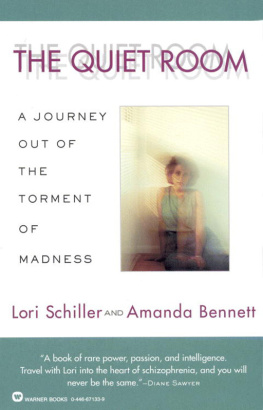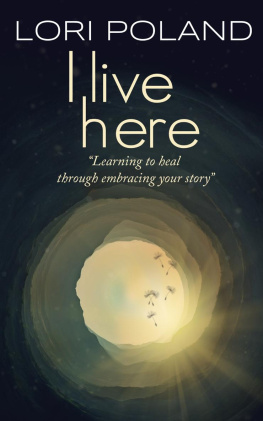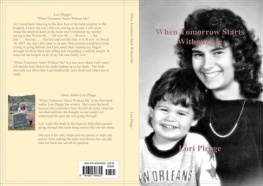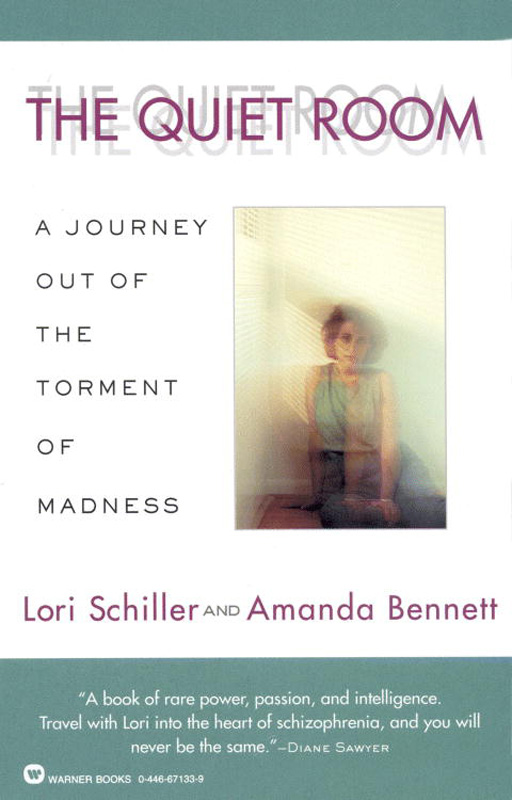Schiller Lori - The quiet room : a journey out of the torment of madness
Here you can read online Schiller Lori - The quiet room : a journey out of the torment of madness full text of the book (entire story) in english for free. Download pdf and epub, get meaning, cover and reviews about this ebook. City: New York, NY, United States, year: 1996, publisher: Grand Central Publishing;Warner Books Edition/Hachette Book Group, genre: Home and family. Description of the work, (preface) as well as reviews are available. Best literature library LitArk.com created for fans of good reading and offers a wide selection of genres:
Romance novel
Science fiction
Adventure
Detective
Science
History
Home and family
Prose
Art
Politics
Computer
Non-fiction
Religion
Business
Children
Humor
Choose a favorite category and find really read worthwhile books. Enjoy immersion in the world of imagination, feel the emotions of the characters or learn something new for yourself, make an fascinating discovery.
- Book:The quiet room : a journey out of the torment of madness
- Author:
- Publisher:Grand Central Publishing;Warner Books Edition/Hachette Book Group
- Genre:
- Year:1996
- City:New York, NY, United States
- Rating:3 / 5
- Favourites:Add to favourites
- Your mark:
The quiet room : a journey out of the torment of madness: summary, description and annotation
We offer to read an annotation, description, summary or preface (depends on what the author of the book "The quiet room : a journey out of the torment of madness" wrote himself). If you haven't found the necessary information about the book — write in the comments, we will try to find it.
Abstract: At a summer camp in 1976, a 17-year-old girl suddenly hears a voice in the night. Booming out through the darkness, it makes her bolt awake. It says things that she has never before imagined. And it will be with her for years to come, tormenting her, robbing her of her sanity and very nearly her life. Lori Schiller was the perfect child - bright, affectionate, and joyfully alive. The firstborn and only daughter of a close-knit family she led a carefree, tranquil life, unaware that within her a secret illness was taking root. Then, at age 17, she began to hear voices in her mind. She told no one. Although the voices became more frequent and sinister, she still managed to graduate from high school, go to a good college, even begin a career. By 23, the voices seemed to take total control: Lori made her first suicide attempt. Soon she was pulled into the mental health care system, beginning an ordeal of institutions, halfway houses, relapses, more suicide attempts and a screaming, full-blown schizophrenia that seemed beyond the reach of any cure. As a chronicle of Loris madness, The Quiet Room offers a rare and powerful look into a terrifying shadow world. But The Quiet Room is even more remarkable because Lori herself has been able to describe her ordeal. In 1989, she began to emerge from the darkness - driven by her own will to survive and an experimental new medication that gave her the first inner peace she had known in years. Drawing on Loris own diaries and fragmented memories, as well as accounts from her family, friends, and doctors, this book takes us into the terrible quiet room, the isolation chamber in which she was confined when the voices overtook her through the therapy sessions and relapses all the way to Loris triumphant recovery. Perhaps the most important book ever written about schizophrenia, The Quiet Room is as powerful today as I Never Promised You a Rose Garden was in its time. It offers hope for anyone touched by mental illness - and is a lesson in survival and courage for us all
Schiller Lori: author's other books
Who wrote The quiet room : a journey out of the torment of madness? Find out the surname, the name of the author of the book and a list of all author's works by series.











